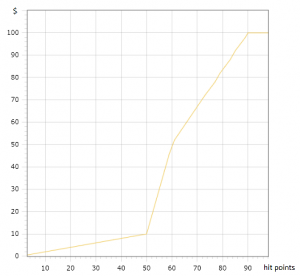Difference between revisions of "Market Value"
Jump to navigation
Jump to search
(Corrected work value to use ticks, as that's how the game code processes it. Using the in-game work is imprecise, as the in-game value is rounded to the nearest second, and thus can give incorrect results from the equation) |
|||
| Line 8: | Line 8: | ||
If not explicitly specified, an item's market value defaults to a formula-determined value: | If not explicitly specified, an item's market value defaults to a formula-determined value: | ||
| − | <big>''M'' = (''I'' + ''W'' × 0. | + | <big>''M'' = (''I'' + ''W'' × 0.0036) × ''Q'' × ''H''</big> |
where | where | ||
* ''I'' = combined market value of all ingredients | * ''I'' = combined market value of all ingredients | ||
| − | * ''W'' = work to make the item | + | * ''W'' = work (in ''ticks'') to make the item. The game displays this in the item information window in ''seconds'' (which assumes 1x game speed and 100% work speed), and also rounds the work value to the nearest second (ex. an item that takes 35 ticks, such as a [[Conduit]], is displayed in-game as 1 Work, despite taking only 0.583 seconds to construct at 100% speed). An approximation of the value for ''W'' can be found by multiplying the in-game Work displayed by 60, but the exact value (in ticks) is defined in the XML definition by the stat ''WorkToMake'' (or ''WorkToBuild'' for buildings). For reference, 60,000 ticks of work (displayed in-game as 1,000 units of work) corresponds to one full in-game day (24 hours) of uninterrupted work at 100% work speed (including bench speed effect and pawn work speed). |
* ''Q'' = quality multiplier (see [[quality]]) | * ''Q'' = quality multiplier (see [[quality]]) | ||
* ''H'' = health multiplier (only applies if the item has [[Deterioration|deteriorated]] past a certain point). This only seems to apply to certain items, as controlled by their XML definition. See [[Deterioration]] for details. | * ''H'' = health multiplier (only applies if the item has [[Deterioration|deteriorated]] past a certain point). This only seems to apply to certain items, as controlled by their XML definition. See [[Deterioration]] for details. | ||
Revision as of 19:14, 4 March 2022
Market Value is a stat: The market value of an object. The actual trade price will be adjusted by negotiation skill, relationship status, and other contextual factors..
If not explicitly specified, an item's market value defaults to a formula-determined value:
M = (I + W × 0.0036) × Q × H
where
- I = combined market value of all ingredients
- W = work (in ticks) to make the item. The game displays this in the item information window in seconds (which assumes 1x game speed and 100% work speed), and also rounds the work value to the nearest second (ex. an item that takes 35 ticks, such as a Conduit, is displayed in-game as 1 Work, despite taking only 0.583 seconds to construct at 100% speed). An approximation of the value for W can be found by multiplying the in-game Work displayed by 60, but the exact value (in ticks) is defined in the XML definition by the stat WorkToMake (or WorkToBuild for buildings). For reference, 60,000 ticks of work (displayed in-game as 1,000 units of work) corresponds to one full in-game day (24 hours) of uninterrupted work at 100% work speed (including bench speed effect and pawn work speed).
- Q = quality multiplier (see quality)
- H = health multiplier (only applies if the item has deteriorated past a certain point). This only seems to apply to certain items, as controlled by their XML definition. See Deterioration for details.
Items with a market value of above 200 will have their market value rounded to be divisible by 5, with a remainder of 2.5 being rounded down. Prices over $10 will be rounded to the nearest whole number.
Version History
- 1.1.2618 - Prices now only display decimals when under $10.
